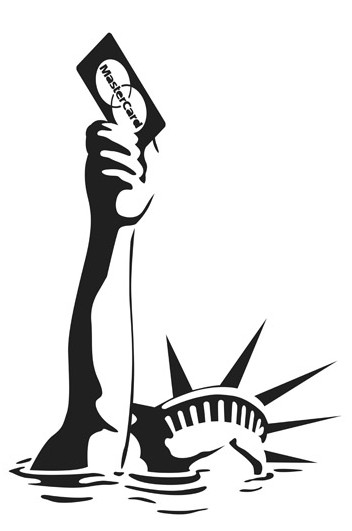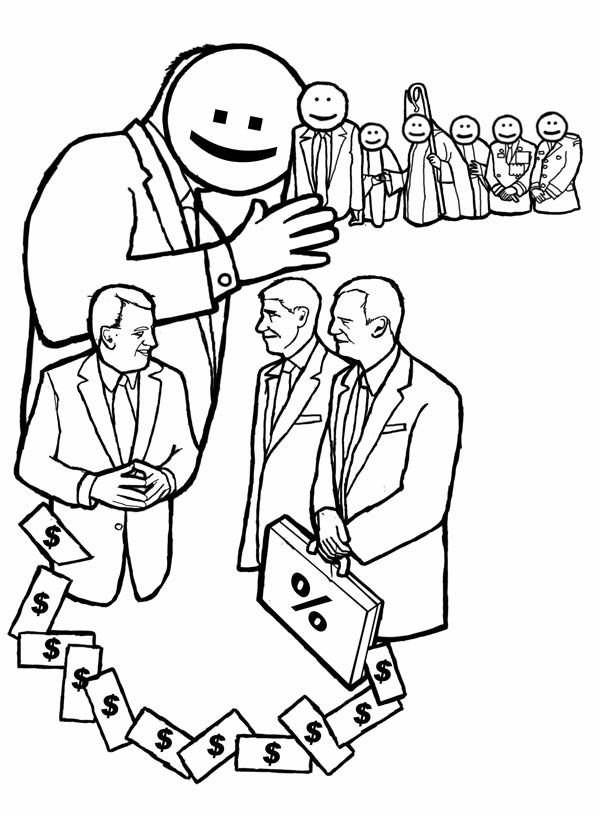|
|||||||||||||
|
Benefiting From Kings Ruling Industry? Is It Beneficial to Everyone By Punkerslut
Who Owns Society?
What is Capitalism, if it is nothing more than just a few people acting like kings over the world's property? What is the "free enterprise system," when it only means that all of the decisions of the economy are made by a tiny amount of the population? What is private ownership of society's productive forces -- if it doesn't mean that kings and queens will be the rulers of industry? Now the question is... are you really benefiting from powerful monarchs having isolated control of all of society's industries? By describing them as "kings and queens," this is a reference to the power which they wield over the means of production. Like a king, they have absolute power; but the Capitalist is limited by the property line, whereas the king is limited by the national border. Under their own dominion, their word is unquestioned and their rights are unlimited. There may be laws that prohibit dumping toxic waste into the ground, or a constitution that prohibits "arbitrary use of power" by a king. But for every law passed against the landlords and princes, there is a landlord or prince who breaks the law. The ruler of land, like the ruler of the throne, still maintains the greatest power in their part of society, despite any possible regulations passed upon them. The Activities of Society's Owners
What does the dictator, the king, the despot, or the monarch do? They behave as the managers of their empire. They allocate human resources, like military, advisors, and magistrates, and they also allocate physical resources, like tax funding, subsidies, and licensing. By themselves and without the consent of the people, they can pass laws that effect them in the most direct ways. They have outlawed religions, prohibited freedom of speech, massacred crowds, and imprisoned millions. The life of the monarch consists in giving orders and passing laws that turn the empire into whatever may be desired -- this means wars for expanding territory, high taxes for impressive palaces, and maintaining a party of favorites who live off of the many. Such a party may be aristocrats, bureaucrats, noblemen, generals, or vassals. These are the activities of the king, or the ruler of society's politics. What does the Capitalist, the aristocrat, the investor, or the landlord do? Like any king or queen, they are the managers of their own private empires. They organize the workers in production, which consists in giving orders, hiring new labor, and firing old labor. They also make the decisions in organizing the means of production, whether this field shall be ploughed or that one. This decision-making is influenced by their desire for profit, which means they'll plant rubber if it receives more wealth than corn, even if the local population is starving. They have left millions in hunger, without homes, and in a position where they must beg for work or just to live. The life of the Capitalist, then, is not much more than passing laws and giving orders like the king -- except this authority is over people as workers, not over people as subjects. It is still, by and far, the vast majority of people who are under their control, whether examining the kingdom of an investor or a queen. The activity of the investor, then, is in creating wealth for themselves, even if it means creating poverty for the many -- just as the king's activity is to accumulate power and wealth for themselves, at the cost of creating poverty for their subjects. These are the activities of the Capitalist, or the ruler of society's economy. The King and the Capitalist have been in power by one trick: convincing the people that the system of one-ruling-the-many best serves the interests of the common people. It is commonly said that kings provide order and justice to society, but this is not so -- it is provided by the people who provide the material and the labor to build up whatever systems of justice are established. Likewise, the Capitalist is often saying that they provide the materials needed for production, like factories and mines. Again, this is not something created by the Capitalist, but built up by the workers themselves. There is not one king who patrolled the streets looking for murderers, and there is not one Capitalist who worked on their own assembly line. They do not provide anything in terms of actual contributions to society, but they take for themselves the glory of what the masses of people have achieved.
Are There Alternatives to Domination?
Do you receive any benefit from a king? When they pass laws, they are made against you, and this is clearly so, since you have absolutely no voice in the process of decision-making. They exist only because of the taxes that they levy upon your activities as a subject. And do you receive any benefit from a Capitalist? When they give orders, they are against you, and likewise, you have no voice in the decision-making process. They exist only because of the profits that are taken out of your labors as a worker. You do not benefit from either system of domination, as you are exploited by the possessor of the land and oppressed by the possessor of the throne. Can there be any alternative? To monarchy and authoritarianism, there is Democracy -- or direct rule of society by the people. And to Capitalism and aristocracy, there is Socialism -- or direct rule of economy by the workers. But the rulers of government, like the rulers of capital, spend excessive amounts of wealth and energy in trying to convince the people that these alternatives are impossible. They will say, for instance, that a king is responsible the positions of a million soldiers that are making a siege on a city; and to get everyone agree to these million decisions in the one hour needed would be impossible. Likewise, those who are opposed to workers' control will say that millions of workers will have to get together to decide how many toothpicks to make this week. It is impossible for the people to intelligently order society according to their own interests -- this is the cornerstone of all arguments against either Democratic society or Socialist economy. The people themselves are incapable of working together to achieve mutual, reciprocal ends. They must be dominated, controlled, threatened, starved, and imprisoned, if it is so the will of the Capitalist or Statesman. Are There Alternatives to "Representative" Domination?
The entire idea of domination itself must be challenged. It is not enough for Democracy to demand simply that the decisions of a massive government are in the hands of the people. It must demand that each person has a right to order their own life according to how they desire, without the voice or opinion of some voter who may ten thousand miles away. Law itself must be entirely abolished and replaced by free, voluntary, cooperative efforts between all members of society. If a king has a genius of the empire that is within their position, then people have the genius of the empire that is their life within society. Each person knows better than anyone else what their interests may be. Rule of government be a king cannot be replaced by rule of government with a so-called "representative." This will leave the system of police, imprisonment, wars, and an isolated, wealthy class that controls the economy. "Representative" democracy is a system where each person has an extremely tiny voice in a decision-making process that threatens them with the same miseries of monarchist government. True democracy is a system where each person is the unrestricted king of their own lives, entering into whatever associations or voluntary agreements they desire. It would be absurd to ask those living in Madagascar and those living in Mongolia to meet together and pass laws that shall effect both areas. They are both subject to their own particular cultures, customs, religions, and popular practices of agricultural or industry. And yet, there are those who would ask two provinces or states to share the same "federal" laws, those who would ask two neighboring counties to share the same "state" laws, etc., etc.. The differences that exist between two cultures on opposite parts of the globe may as well represent the differences that could exist between two neighbors in any country. There is no real common law that can fit all, whether it is democratically decided or not. Similarly, one cannot rely upon any form of "representative" Socialism, whether it is the elected president of the Communist Party or a Socialist trade union. Just as every citizen must organize their own life, without the domination of the majority, so must every worker organize their own labor. Factories, mines, fields, and farms should each have a collective decision-making process, where each person shares an equal voice. And, it is not one voice out of ten million, as it is in "representative" government. It is not someone living in the arctic trying to organize a collective, decision-making process with those who live in deserts. It is each person freely joining whatever association they desire, and each association organizing its own life according to how its members' mutual interests. It would be absurd for those in mining to pass decisions on what farmers shall plant and when they shall harvest. Just as it is absurd for factory workers to pass regulations on the conditions in which miners shall work, or for truck drivers to have a voice in the training of airplane pilots. For a person in China to determine to the laws governing social behavior in Britain is like a person in the textile industry determining the workhours of those who write music. It would be an absurdity to create a Socialist economy, where each worker had a tiny, almost insignificant voice in a massive structure. Both true Democracy and true Socialism require intensive quantities of decentralization. Real freedom does not consist in extending any person's decision-making power over others; it consists in increasing the person's liberties in society and opportunities in economy. It focuses on the freedom of the person to themselves, not the freedom of the person to others. The economy of Socialism will be many independent, self-governing firms, whether in mining, agriculture, transportation, services, or manufacturing. The society of Democracy, likewise, will be many independent associations of individuals, which come together to cooperatively achieve solutions to their mutual interests. In society, as in economy, you do not benefit from having an isolated authority. You do not receive any gain in your personal liberty from having someone make decisions over you. The only way to be completely unrestricted in achieving whatever gives you happiness is to become a self-ruler, both in society and in economy -- to overthrow the laws of Government, as well as the ownership of Capitalism. Punkerslut,
|




